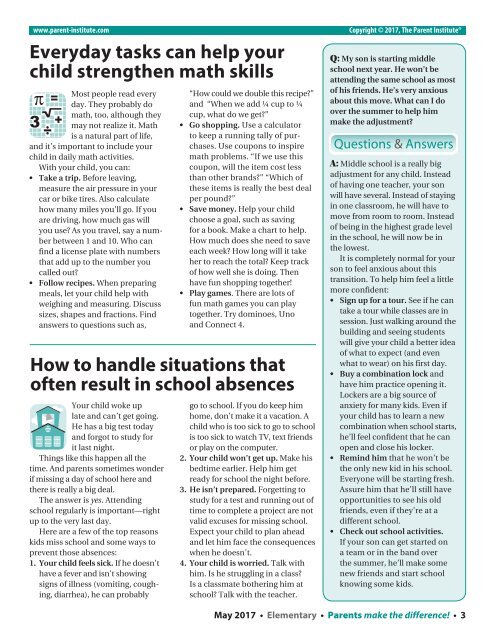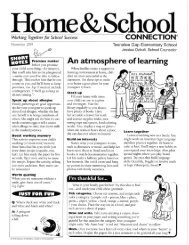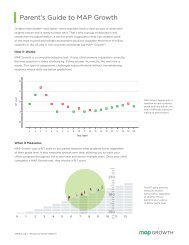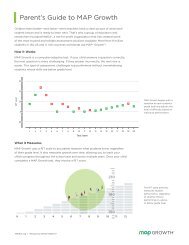elemmay17
Create successful ePaper yourself
Turn your PDF publications into a flip-book with our unique Google optimized e-Paper software.
www.parent-institute.com<br />
Everyday tasks can help your<br />
child strengthen math skills<br />
Most people read every<br />
day. They probably do<br />
math, too, although they<br />
may not realize it. Math<br />
is a natural part of life,<br />
and it’s important to include your<br />
child in daily math activities.<br />
With your child, you can:<br />
• Take a trip. Before leaving,<br />
measure the air pressure in your<br />
car or bike tires. Also calculate<br />
how many miles you’ll go. If you<br />
are driving, how much gas will<br />
you use? As you travel, say a number<br />
between 1 and 10. Who can<br />
find a license plate with numbers<br />
that add up to the number you<br />
called out?<br />
• Follow recipes. When preparing<br />
meals, let your child help with<br />
weighing and measuring. Discuss<br />
sizes, shapes and fractions. Find<br />
answers to questions such as,<br />
How to handle situations that<br />
often result in school absences<br />
Your child woke up<br />
late and can’t get going.<br />
He has a big test today<br />
and forgot to study for<br />
it last night.<br />
Things like this happen all the<br />
time. And parents sometimes wonder<br />
if missing a day of school here and<br />
there is really a big deal.<br />
The answer is yes. Attending<br />
school regularly is important—right<br />
up to the very last day.<br />
Here are a few of the top reasons<br />
kids miss school and some ways to<br />
prevent those absences:<br />
1. Your child feels sick. If he doesn’t<br />
have a fever and isn’t showing<br />
signs of illness (vomiting, coughing,<br />
diarrhea), he can probably<br />
“How could we double this recipe?”<br />
and “When we add ¼ cup to ¼<br />
cup, what do we get?”<br />
• Go shopping. Use a calculator<br />
to keep a running tally of purchases.<br />
Use coupons to inspire<br />
math problems. “If we use this<br />
coupon, will the item cost less<br />
than other brands?” “Which of<br />
these items is really the best deal<br />
per pound?”<br />
• Save money. Help your child<br />
choose a goal, such as saving<br />
for a book. Make a chart to help.<br />
How much does she need to save<br />
each week? How long will it take<br />
her to reach the total? Keep track<br />
of how well she is doing. Then<br />
have fun shopping together!<br />
• Play games. There are lots of<br />
fun math games you can play<br />
together. Try dominoes, Uno<br />
and Connect 4.<br />
go to school. If you do keep him<br />
home, don’t make it a vacation. A<br />
child who is too sick to go to school<br />
is too sick to watch TV, text friends<br />
or play on the computer.<br />
2. Your child won’t get up. Make his<br />
bedtime earlier. Help him get<br />
ready for school the night before.<br />
3. He isn’t prepared. Forgetting to<br />
study for a test and running out of<br />
time to complete a project are not<br />
valid excuses for missing school.<br />
Expect your child to plan ahead<br />
and let him face the consequences<br />
when he doesn’t.<br />
4. Your child is worried. Talk with<br />
him. Is he struggling in a class?<br />
Is a classmate bothering him at<br />
school? Talk with the teacher.<br />
Copyright © 2017, The Parent Institute®<br />
Q: My son is starting middle<br />
school next year. He won’t be<br />
attending the same school as most<br />
of his friends. He’s very anxious<br />
about this move. What can I do<br />
over the summer to help him<br />
make the adjustment?<br />
Questions & Answers<br />
A: Middle school is a really big<br />
adjustment for any child. Instead<br />
of having one teacher, your son<br />
will have several. Instead of staying<br />
in one classroom, he will have to<br />
move from room to room. Instead<br />
of being in the highest grade level<br />
in the school, he will now be in<br />
the lowest.<br />
It is completely normal for your<br />
son to feel anxious about this<br />
transition. To help him feel a little<br />
more confident:<br />
• Sign up for a tour. See if he can<br />
take a tour while classes are in<br />
session. Just walking around the<br />
building and seeing students<br />
will give your child a better idea<br />
of what to expect (and even<br />
what to wear) on his first day.<br />
• Buy a combination lock and<br />
have him practice opening it.<br />
Lockers are a big source of<br />
anxiety for many kids. Even if<br />
your child has to learn a new<br />
combination when school starts,<br />
he’ll feel confident that he can<br />
open and close his locker.<br />
• Remind him that he won’t be<br />
the only new kid in his school.<br />
Everyone will be starting fresh.<br />
Assure him that he’ll still have<br />
opportunities to see his old<br />
friends, even if they’re at a<br />
different school.<br />
• Check out school activities.<br />
If your son can get started on<br />
a team or in the band over<br />
the summer, he’ll make some<br />
new friends and start school<br />
knowing some kids.<br />
May 2017 • Elementary • Parents make the difference! • 3

















